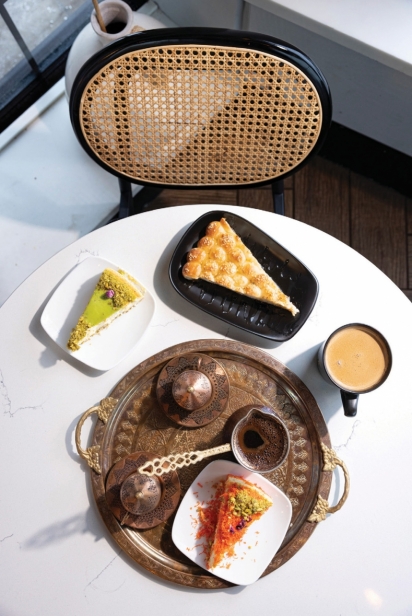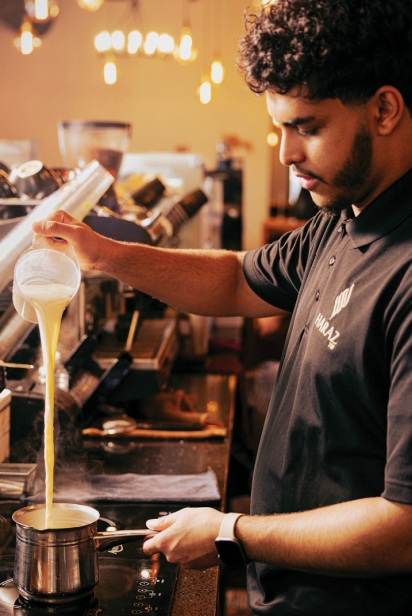Coffee and Culture
Several Yemeni-owned coffee shops across Southeast Michigan are hoping to change the narrative about Yemen with a cup of coffee.
A YEARS-LONG civil war in Yemen, located at the southern tip of the Arabian Peninsula, has led to the deaths of thousands of civilians, leading to a major humanitarian crisis.
For many, that may be the only thing they know about the country, which is also believed to be the birthplace of coffee.
“A lot of people didn’t know about Yemen, or where Yemen is,” says Aiman Yahya, a partner with Finjan Café in Garden City, which opened in October 2021. “So whenever you talk to someone about Yemen, they think of war. They don’t think of the beauty of what Yemen has—from coffee, from the food, from a culture, from everything,” he says.
Yahya says Yemeni coffee houses play a role in shedding a positive light on the vast history and richness of the country.
Hamzah Nasser, the founder and CEO of Haraz Coffee House, says he’s on a mission to educate people about the country, its coffee and its culture. Its first location opened in Dearborn in April 2021. It has since expanded to 14 locations across the U.S. Haraz is named after the Haraz Mountains in Yemen, where coffee is grown in valleys. Cultivation from planting to producing coffee beans can take several years.
“Coffee started with an amazing culture, and so many amazing things came out of coffee,” he says.
Yahya says Finjan also wanted to share the culture and history of coffee. Finjan means “a cup of coffee,” in Arabic.
“Coffee is part of the Yemeni life. We drink coffee in the morning, in the afternoon, even at night,” Yahya says. “So we decided to open Finjan to inspire the world about Yemeni coffee and the history of Yemen.”
Unlike many of the other Yemeni coffee shops in Southeast Michigan that first opened in Dearborn, Finjan Café had to introduce their concept to an audience who wasn’t familiar with Arabic-style coffee boasting flavors such as cardamom, cinnamon or ginger.
Yahya says it was challenging to get the message out to people.
“They [people] were not sure about trying Yemeni coffee,” he says, but after learning about the history and the origins of where the coffee comes from, people were more willing to try it.
More than just coffee
Many Yemeni coffee shops are known for their distinctive style—equipped with a map of Yemen and the history of coffee, a farm-to-table method, plastered on a wall through various forms of artwork, to educate people.
Nasser says many coffees are named after cities and unique coffee styles.
“So if you go to Juban, they add ginger husks in cinnamon to their coffee,” he says, referring to the drinks from this particular region in Yemen.
Mocha was named after the Port of Mocha in Yemen, known for its chocolatey coffee beans.
The businesses use organic coffee beans from Yemen. Nasser says he pays farmers a fair wage.
“We’re making sure that they’re making enough money to send their kids to school, to build a home, build a future, buy a car and to live just as normal as we’re living here,” Nasser says.
Yahya says people enjoy the flavors and spices in Yemeni coffees and teas like the Adeni chai, a tea drink from Aden, Yemen, made with black loose-leaf tea, cardamom, cinnamon and milk.
“I think it’s special because we’re using the really old ways of making coffee,” he says.
“We use methods our families have been using for decades from spices to traditional hot pots to boil our coffee and tea. The methods we use for tea is different from coffee … we make one of the special method called mofawar. The word mofawar comes from boiling; we boil coffee with milk and we keep on low fire till it boils. This method is very old.”
At Haraz Coffee House people can order an espresso, Americano or latte. There’s also specialized drinks like the Harazi, their version of the mofawar cardamom and cream drink; Maleki, coffee with ginger husks, cinnamon and light cream; or Iced Adeni, a black tea with cream and Haraz spices and foam. Finjan Café has similar drinks and house specialties like the Finjan or pistachio latte.
Both cafés offer sweets like milk cakes infused with saffron, rose milk and topped with whipped cream, and Bee Bites, named after a popular Yemeni dish called Khaliat Al Nahl. It’s a honeycomb-shaped dough filled with cream cheese, drizzled with honey and topped with sesame and black (nigella) seeds.
Both businesses, which have become community staples, plan to keep growing and spreading their message about Yemeni coffee and their culture.
Yahya says Finjan, which sells about 200 cups daily at its Garden City location, is expanding to six locations such as Tennessee, Virginia and North Carolina.
Nasser was planning to open two more Haraz locations, in Irving, Texas, and the Michigan State University campus by the end of January. Last year, he added a Haraz Coffee School with a barista academy in Dearborn.
Nasser says Haraz is more than just a business.
“We’re there to create jobs,” he says. “We’re there to give back to the community. We’re happy to be part of every single community that we are in.”
Nasser adds Haraz is more than just a cup of coffee—it’s an experience.
“We’ve created a clean environment for people to come, whether they want to work, whether they want to enjoy time with family and, you know, just socialize with friends. It’s the place to go to,” he says.
Haraz Coffee House
Finjan Café
Nargis Hakim Rahman is a Bangladeshi American Muslim journalist and writer. She’s a reporter and producer for WDET 101.9 FM, Detroit’s NPR station. Nargis graduated from Wayne State with a bachelor’s degree in journalism. She is passionate about community journalism in the Greater Detroit area. Her work has appeared in Condé Nast Traveler Middle East, Huffington Post, NPR, YES Magazine!, Haute Hijab, Eater Detroit, and more.






